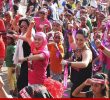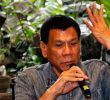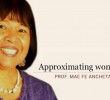In the 60s, the first wave of migrants from the Philippines to the United States landed in Hawaii and neighboring states to settle as migrant workers with no specific professional and gendered identities, except that some were technically skilled and some were college degree holders or intellectually and academically advantaged in their own right.
Out-migration was already explored as an option to improve the lives of the entire families, desirous to venture in foreign lands, to seek greener pasture, as the cliché goes.
This attempt was a prelude to the more aggressive push of job seekers for work abroad. It is a known fact that out-migration at this period was aimed at settling for good and that host countries, like the US, initially received the Filipinos as permanent residents as jobs security was ensured.
However, the shift and trend reflected a policy framework — the beginning of the labor export policy of former President Ferdinand Marcos, the deposed dictator, in the 70s. The post Martial law leaders, boost its mechanism of implementation in a fashion attuned to the needs and interests of the core countries. Core countries, as Valiani (2012) describes it, are countries that receive or host the migrants, on temporary or permanent status.
In the context of Philippine labor export policy, the chief government unit, Philippine Overseas Employment Agency (POEA) has grown up into a mature agency that primarily oversees the employment opportunities abroad with its mandates on the bases of the legal issuances of the Philippine state.
For one, there is Presidential Decree 798 of 1982. This particularly provides the agency the authority to promote and develop the overseas employment program as well as protect the rights of migrant workers. Another legal guidance expressed in the Executive Order 247 issued in 1987 stipulates that POEA regulates private sector participation in recruitment and overseas placement, maintain registry of skills and secure best terms of employment for overseas Filipino workers (OFWs).
In order to strengthen its mandate as lead government organization in promoting overseas work, a law promulgated in 1995, known as Republic Act 8042 as amended by RA 9422, specifically sets policies of overseas employment and establish a higher standard of protection and promotion of the welfare of migrant workers, their families and overseas Filipinos in distress, and for other purposes. The POEA website summarizes mainly the law as to its element of tripartism (workers, state and private sector), full disclosure, regulation of private sector in recruitment of workers for overseas, selective deployment, and dynamism in systems and information technology.
The laws seem to be proactive in that the state creates overseas employment program “solely on the assurance that the dignity and fundamental human rights and freedoms of the Filipino citizen shall not, at any time, be compromised or violated”. Further, it declares that “while recognizing the significant contribution of Filipino migrant workers to the national economy through their foreign exchange remittances, the State does not promote overseas employment as a means to sustain economic growth and achieve national development. The State, therefore, shall continuously create local employment opportunities and promote the equitable distribution of wealth and the benefits of development”.
OFW situation
Let’s take a look at the situation of Filipinos, who have been driven internally and externally to work abroad, which is warranted in making flesh to the policy environment described earlier.
The biggest self-organization of Philippine migrant workers, MIGRANTE International, has recorded that 50% of cases it has currently handled are cases of rape and sexual abuse against women OFWs. The increasing figures of cases tend to be directly proportional to the number of Filipinos going out of the country with more than 4,000 a day and 50 percent of whom are women.
But why are Filipinos daring to go for work abroad? It is simply because there are no decent jobs in the homeland. There is problem of food on the table, when urban poor homes are set for demolition by the state forces, when farms are taken by the landlords for crop and land-use conversions, when children and young people cannot get health care and education.
In Hongkong alone, there are more than 300,000 domestic helpers comprised largely of female college level or degree holders. Some of them are, in fact, elementary educators back home. In the Middle East, female nurses, sales clerks and artists abound compete with other Asian countries in terms of work posts and wages.
The United States of America, Canada and Australia are considered core countries with their Philippine local partners actively creating spaces in the work arrangements made possible by the state’s laws.
Large figures of Filipino migrant workers in Southeast/Northeast Asia targeting Singapore, Malaysia, Indonesia, Thailand, Japan, South Korea and Taiwan are also beginning to sprout. It is in this Asian region where recruitment goes through more illicit forms and processes that entice young women to get through the seemingly orderly manner of landing a job as entertainers or cultural workers.
The POEA accredits cultural workers recruitment agencies, but end up sending young women as guest relations officers (GROs) cum cultural workers in brothels and clubs in these adjacent countries and forced into prostitution.
Attack Vs Balikbayan Boxes
The points earlier are illustrations of how migration in the Philippines remains a job push. However, the current administration under President Benigno Aquino’s “straight path” thematic leadership brings in another disaster to the very core of Filipino psyche – the attack against Balikbayan boxes.
The recent declaration of opening each BBbox for inspection by the Bureau of Customs (BOC) breaks the souls of the more than 10 million Filipino overseas contract workers spread globally. It signals a strong arousal for a broad and massive resistance among Filipino compatriots.
At first, the economic value of BBbox may not be a question, but the care and solidarity associated to the preparation of the BBbox before final packaging towards forwarder’s collection and delivery to the recipients matter.
Filipinos strongly identify themselves with the box they send as a loving expression of a relationship distracted by distance and separation that counts not just months but years. Valuing the contents of the box put together neatly, avoiding spaces to withstand irregular handling when thrown from container-cargo van to another during forwarding, is akin to a family bond that needs to fill socio-emotional elements in order to strengthen it in order to sustain social pressures due to long separation.
But the scenario poses critical issue as observers continue to note the tax target of BOC to the tune of P600 million for 2015 out of the migrants. The milking cow order is bared.
The box that symbolizes Filipino family solidarity carries with it the struggle of Filipinos. The box ruling further opens the floodgates to migrants seeking basic genuine reforms that seeks to dismantle neoliberal schemes.










